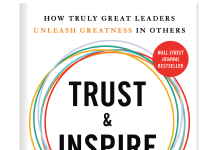
As part of this development process, enterprises need to ensure that constructive lessons are learned from mistakes and take appropriate measures to ensure that they are not repeated. Moreover, enterprises need to utilize learning to teach success stories. Education must also be instrumental in predicting future threats and identifying potential opportunities. This article focuses on understanding the value of a learning organization and the key elements that are fundamental to implementing a core principle outlined in my book, Ascend to Greatness: How to Build an Enduring Elite Company.
Building an Exceptional Learning Organization
The importance of the ability to continuously learn from both success and failure cannot be overstated. When companies repeat mistakes, the cumulative effect on the company’s performance can be severe. An enterprise must implement appropriate mechanisms to ensure that the company learns valuable and actionable lessons. As the legendary Jack Welch once said, “An organization’s ability to learn and translate that learning into action rapidly is the ultimate competitive advantage.”
There are seven fundamental components that I have identified to build a successful and high-impact learning organization. For these elements to be successful, it’s crucial to understand that they must be underpinned and driven by vigorous processes and discipline.
#1. A Real-Time Scan of the Environment
Scanning the environment in real-time is a fundamental element of learning. What is learned from scanning the environment must be communicated within the organization and integrated into training programs. The relevant information gleaned from scanning the environment needs to be incorporated into the strategic planning process. Enterprises need to use learning in such a way that it gives them the ability to predict positive and negative future outcomes better.
#2. The Global Leadership Team Meeting
There are three valuable outcomes from an effective global leadership team meeting. The first outcome is learning. This is the forum where lessons learned can be shared and spoken about with all the leaders of the enterprise. This group will implement the necessary changes for failures and will likewise be responsible for adopting winning strategies.
Another primary function of the meeting is to introduce fresh critical thinking. This is usually done by bringing in the outside thought leaders who speak on various subjects such as innovation and technology trends. Also, this is the forum for a robust dialogue on future trends that are probable or likely to impact the enterprise. The other essential outcome of the leadership meeting should be strengthening team members’ connections. This can be accomplished by allowing time for people to connect by sponsoring events that support peer connections and holding team-based workshops.
#3. An Internal University
An effective way to ensure that learning is instilled in the organization is to create an internal university. An internal university usually takes many forms depending on the company’s size and the allocated resources. Most organizations supplement the internal university with outside professional training.
For an internal university to be successful, it should have a clearly defined core purpose. The curriculum of the university should always be guided by its core purpose. Otherwise, the university will ultimately fail. The university’s primary objectives should be to train future leaders, communicate the company’s strategy, and sustain a strong culture. One of the risks often pointed out about internal universities is that managers are not exposed to fresh outside ideas. This can be countered by using a mix of internal and external professors.
#4. A Learning Excellence Team
A learning excellence team should be formed in the company, and it should function as a focal point for developing future leaders and supporting employee learning in accordance with the enterprise’s purpose, core values, and vision. What’s essential is for the team to be small and be led by a talented person. The team should be responsible for developing a results-oriented curriculum for the internal university in concert with outside experts. The learning team should also monitor trends and best practices and incorporate these into the leadership development programs. Finally, the team needs to establish appropriate metrics for measuring success.
#5. Joint Ventures and Strategic Alliances
Well-established joint ventures and strategic alliances can be a powerful force in supporting a learning entity. There is much that can be learned from outside business partners and alliances. Enterprises need to implement appropriate mechanisms to ensure that lessons learned from these potentially valuable sources are shared and communicated within the company. Any best practices that are superior to what is currently being utilized within the organization should be adopted. As I explain in Ascend to Greatness, the Roman Legion was very adept at embracing best practices learned from others.
#6. After-Action Reviews
An after-action review is a formal process established by the enterprise to wholly and thoroughly review important initiatives with the sole objective of learning and improving. The debrief needs to occur after both negative and positive outcomes. For a post-event debrief assessment to be successful, it must be driven by honesty and transparency. It’s also necessary that the proposed recommended actions emanating from the event are implemented immediately.
After-action reviews are vital because human memory tends to be, at times, selectively poor. We sometimes attribute results to a different cause than the facts suggest. This cognitive bias can attribute success and failure either disproportionally or entirely inaccurately. Worst of all, this can result in flawed decision-making by leaders and boards. This is why after-action reviews are essential, as they are potent mechanisms that prevent history from being rewritten. Companies that are exceptional at learning through post-event debriefing will likely not suffer from attribution errors.
#7. Lessons Learned from Indispensable Experiences
The lessons learned from necessary experiences are effective in helping one to transfer those valuable experiences to the enterprise. These experiences can come from elite leaders and exceptional organizations. These shared experiences are something that an enterprise and its team can surely benefit from. For example, it is common for CEOs and some executive leadership team members to belong to the board of directors of other companies. Often, the experiences of other companies are excellent resources for learning valuable lessons. It’s common for executives to belong to various professional groups and councils. These likewise can be excellent sources for learning.




